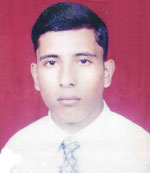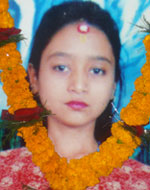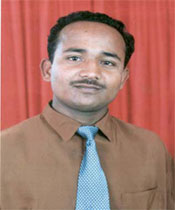Related Links
Case Updates
Krishna Adhikari
 On 6 June 2004, Krishna Prasad Adhikari, a resident of Fujel village of Gorkha District, was murdered in Chitwan District by Maoist cadres. Krishna Prasad was visiting his grandparents after having taken the SLC examinations, and he was abducted from Bakullahar Chowk by men who came on a motorcycle ...
On 6 June 2004, Krishna Prasad Adhikari, a resident of Fujel village of Gorkha District, was murdered in Chitwan District by Maoist cadres. Krishna Prasad was visiting his grandparents after having taken the SLC examinations, and he was abducted from Bakullahar Chowk by men who came on a motorcycle ... Maina Sunuwar
 Around 6 am on February 17, 2004, a group of RNA soldiers arrested Ms
Maina Sunuwar, a 15-year-old schoolgirl of Kharelthok VDC-6, Kavre
district. She disappeared since her arrest. Her family members, with
support from villagers and school where Maina was a student, visited
detention centers ...
Around 6 am on February 17, 2004, a group of RNA soldiers arrested Ms
Maina Sunuwar, a 15-year-old schoolgirl of Kharelthok VDC-6, Kavre
district. She disappeared since her arrest. Her family members, with
support from villagers and school where Maina was a student, visited
detention centers ... Sanjeev Kumar Karna
 Sanjeev Kumar Karna was one among the 11 persons arrested on October 8, 2003. On that fateful day, they had gone to attend a picnic program organized by the students at a place called Kariyachauri VDC-4, and from picnic, they went to Kataiya Chowri Area of Dhanusha district where they ate some food ...
Sanjeev Kumar Karna was one among the 11 persons arrested on October 8, 2003. On that fateful day, they had gone to attend a picnic program organized by the students at a place called Kariyachauri VDC-4, and from picnic, they went to Kataiya Chowri Area of Dhanusha district where they ate some food ... Arjun Bahadur Lama
Arjun Bahadur Lama, 48 years in age, permanent resident of Chhatrebas
VDC -5, Dapcha in Kavre district was abducted by a group of Maoist
cadres, three in number, on 29 April 2005 (2062.1.16 BS) from the
premises of Sri Krishna Secondary School at Chhatrebas VDC-1 of the
district.
» more
Hari Prasad Bolakhe
Hari Prasad Bolakhe, 35 (while missing) a permanent resident of Phulbari VDC-8, Kavre district, a pastor by profession, had been missing since the arrest December 27, 2003, was reportedly killed by security persons. A team of National Human Rights Commission discovered a human skeleton in a jungle ...
» more
Sarala Sapkota
Around 11 p.m. on July 15, 2004, a group of 12 armed soldiers arrested
Sarala Sapkota at her grandfather’s house. The family, who witnessed the
arrest, stated that soldiers gave Sarala no reason for her arrest.
After her arrest, Sarala’s family went to Baireni barracks and the DPO ...
» more
Birendra Shah
On the evening of 5 October 2007, Mr. Birendra Shah, 34, resident of Inruwasira VDC-8, Bara district, a local journalist of Bara district and correspondent of Nepal FM, Avenues Television and Dristi weekly, was abducted by Maoists from Pipara Bazaar in Kalaiya, the district headquarters of Bara ...
» more
Bishwanath Parajuli, Tom Nath Poudel and Dhan Bahadur Tamang
Three persons namely Bishwonath Parajuli (also called Nagendra
Parajuli), Tom Nath Poudel and Dhan Bahadur Tamang of Hasandaha VDC,
Morang were shot dead by the security personnel on 28 September 2004.
According to the eyewitnesses, other victims and the villagers, about 16
people were arrested ...
» more
Chot Nath Ghimire and Shekhar Nath Ghimire
Chot Nath Ghimire, a 58-year-old farmer, resident of Ishaneshor VDC-4,
Ratamate Majhpokhari of Lamjung district was allegedly arrested by the
Joint Security Forces of Joint Security Camp stationed at Bhorlatar VDC,
Lamjung district on February 2, 2002 (2058.10.20). The security camp
called Mr. ...
» more
Bhauna Tharu
Bhauna Tharu (Bhauna Chaudhary in the citizenship card), 21 years old
male (at the time of the incident; Date of Birthe: 8 September 1978),
son of Purna Bahadur Chaudhary, permanent resident of Sujanpur village,
Neulapur VDC-4, Bardiya district, and an employee of Rastriya Gobar Gas,
Gulariya, ...
» more
AF and AHRC Jointly Organize Interaction Program with Nepali Journalists
Speaking in the program Advocacy Forum's Chairperson Mandira Sharma said that the adoption of the bills through ordinance would not be acceptable to victims, victims' families and human rights defenders under any circumstances. "The government passed a law curtailing the power of National Human Rights Commission immediately after the exit of the Office of United Nation High Commissioner on Human Rights in Nepal (OHCHR-Nepal). In this condition the government's attempt to pass the bills through ordinance seems preplanned," she said. She further said that there might be multiple causes behind the passing of the bills through ordinance. Firstly, human rights organizations will oppose the bills if they are passed through ordinance and the government will have a chance to accuse them of non-cooperating on human rights issues. Secondly, there would be no discussion on the content of the bills. Thirdly, the government will accept the bill only under its current form, and would let it fail if it comes under question by other parties. The government had not established the commissions for three years after the election of Constituent Assembly (CA). That it is now trying to form the commission through ordinance after the dissolution of the CA proves that the government is not sensitive towards the demands of victims. If these laws are passed through ordinance they would not comply with the norms and standards entrenched in international law and in treaties of which Nepal is party. The bills passed through ordinance can't address the demands of victims. Likewise, the political parties are not willing to address the human sensitivity which is one of their big weaknesses.
In the program, Basil Fernando, a Sri Lankan national and Policy and Program Director of AHRC, Hong Kong said, "Nepal and Sri Lanka are passing through the same stages. Till 1971 Sri Lanka was a very prosperous country but the politicians, for petty reasons, divided the people along the lines of language, culture and territory and faced an internal war which lasted for decades. He further said that AHRC worked for the promotion and protection of human rights in Nepal during the autocratic rule of Kings in Nepal but even after the reinstatement of democracy the human rights situation in Nepal is not much improved. The subsequent governments are withdrawing criminal cases too instead of prosecuting them which damages the rule of law and human rights protection in Nepal.
In the program the participants had raised various issues of human rights in Nepal and discussed on them.
« Back to overview
In the program, Basil Fernando, a Sri Lankan national and Policy and Program Director of AHRC, Hong Kong said, "Nepal and Sri Lanka are passing through the same stages. Till 1971 Sri Lanka was a very prosperous country but the politicians, for petty reasons, divided the people along the lines of language, culture and territory and faced an internal war which lasted for decades. He further said that AHRC worked for the promotion and protection of human rights in Nepal during the autocratic rule of Kings in Nepal but even after the reinstatement of democracy the human rights situation in Nepal is not much improved. The subsequent governments are withdrawing criminal cases too instead of prosecuting them which damages the rule of law and human rights protection in Nepal.
In the program the participants had raised various issues of human rights in Nepal and discussed on them.
























Join Us